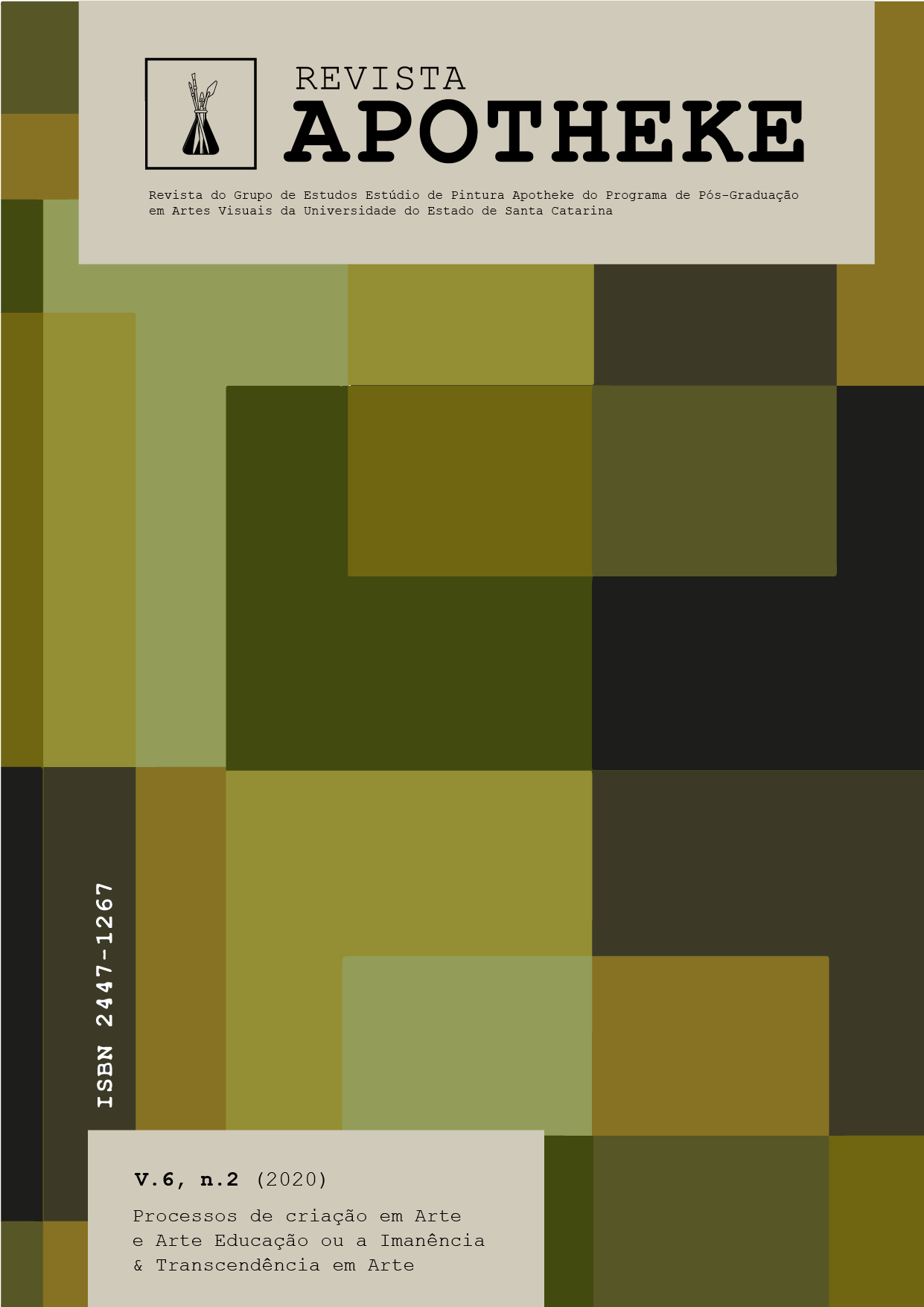Classroom - studio - gallery: The experience with painting in the teacher-artists formation
DOI:
https://doi.org/10.5965/24471267622020046Keywords:
studio , experience , teaching , teacher artist , paintingAbstract
Experience is one determining factors in obtaining new knowledge. The use of the poetic process as a teaching strategy provides meaningful and transformative learning experiences, breaking with the dichotomy between theory and practice. This text presents the results of a study that used the curricular component Painting as a research field, from the Visual Arts Degree course, which was held in the Unochapecó painting studio, during the first semester of 2019. The teaching dynamics used revealed a enlargement of the atelier’s functionalities, perceived as a space for teaching, production and exhibition, showing its relevance in the teacher-artists’s formation. The teaching methodology used was structured in four problem situations: Poetic production; Simulation and dialogue; Assembly of the portfolio; Exhibition. The studio was experienced and analyzed as a space for teaching experiences, being marked by the student’s role, based on the development of skills and not on the content transmission.
Downloads
References
FACCO, Marta Lucia Cargnin. Reflexões sobre o ateliê como lugar/espaço em processos de criação em artes visuais. Revista Digital do LAV, Santa Maria, vol. 10, n. 2, p. 213-227. 2017.
LAMPERT, Jociele; NUNES, Carolina Ramos. Entre a prática pedagógica e a prática artística: Reflexões sobre Arte e Arte Educação. Revista Digital do LAV. Santa Maria: UFSM, vol. 7, n.3, p. 100-12, set./dez, 2014. Disponível em: <http://dx.doi.org/10.5902/1983734814258>. Acesso em: 30 mar. 2018
PELLEGRIN, Ricardo de. O ateliê de pintura como espaço pedagógico colaborativo: práticas do artista-professor no ensino superior. In: MORENO, Márcia; MONEGO, Sonia (Org.). Pesquisa e Prática em Artes. Chapecó: Editora Argos, 2017. p. 35-46.
SILVA, Fernanda Pequeno da. Ateliês Contemporâneos: possibilidades e problematizações. Anais do 56º Encontro da Associação Nacional de Pesquisadores em Artes Plásticas, Rio de Janeiro, 2011. p. 59-73. Disponível em: <http://www.anpap.org.br/anais/2011/pdf/cc/fernanda_pequeno_da_silva.pdf>. Acesso em: 30 mar. 2018.
KRAUSS, Rosalind. A escultura no campo ampliado. Tradução Elizabeth Carbone Baez. Reedição. Revista do Curso de Especialização em História da Arte e Arquitetura no Brasil, PUC - Rio de Janeiro, 1984.
Downloads
Published
How to Cite
Issue
Section
License
Copyright (c) 2020 REVISTA APOTHEKE

This work is licensed under a Creative Commons Attribution-NonCommercial 4.0 International License.
Copyright and Licensing Policy
Authors of works submitted to Revista APOTHEKE authorize their publication in both print and digital formats exclusively for academic purposes. Reproduction is permitted, provided that the source is properly cited. Authors confirm the originality, authorship, and unpublished status of their manuscripts.
Articles published by the journal are freely available and intended for academic and non-commercial use only. All copyrights are transferred to the journal. The content of signed articles reflects the views of their respective authors and not the official position of Revista Apotheke. The author(s) agree to always cite the following reference when republishing or referring to the content originally published in Revista Apotheke:
“This article was originally published by Revista Apotheke in volume (insert volume), number (insert number), year (insert year), and is available at: http://www.revistas.udesc.br/index.php/APOTHEKE/index”
It is the sole responsibility of the authors to obtain written permission for the use of any material protected by copyright law included in their articles. Revista Apotheke is not responsible for copyright infringements committed by contributors.
Authors retain copyright and grant the journal the right of first publication, with the work licensed under a Creative Commons Attribution-NonCommercial License (CC BY-NC):
-
Attribution (BY): Licensees are allowed to copy, distribute, display, perform, and create derivative works, provided that proper credit is given to the author or licensor, in the manner specified.
-
NonCommercial (NC): Licensees may use the material only for non-commercial purposes.
After publication, authors retain the rights to their work and may republish the text.



